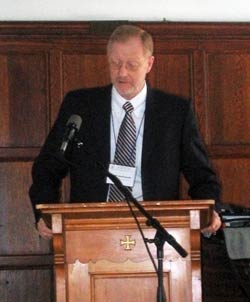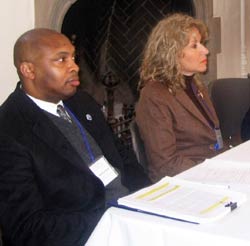The Field Reacts
Yes, there are problems with school leadership programs. Beyond that, however, the only consensus is that they won't be easily fixed.
A panel of five experts concurred with most of the core findings in TC President Arthur Levine's study of America's university-based programs that prepare principals and superintendents. However, several took issue with some of Levine's recommendations-most notably his call to do away with the Ed.D. degree awarded to many principals.
The panel heard Levine present his report-"Educating America's Leaders"-as part of a recent weekend conference organized by TC's Hechinger Institute on the Media. The event was attended by more than 60 education reporters from newspapers and television and radio stations around the country, and stories have since appeared in The New York Times, USA Today, Education Week, and other major publications.
"I believe an Ed. D. is an important component for any administrator and that a Ph.D. should not solely be for scholars," said Hechinger panelist Peter McFarlane, principal of the Hugo Newman College Preparatory School in New York City, who noted that he had earned his own doctorate at Teachers College. "I believe in life-long learning, and I want to ground my own understanding with theory and research. A lot of things I do in my school are based in the research, and research has helped guide changes in my building." McFarlane has earned widespread praise for moving his institution off the state's "failing schools" list.
In addition to changing and standardizing the degrees offered to principals and superintendents, Levine's report also proposes linking promotions and pay increases for leaders and aspiring leaders exclusively to job-relevant coursework; instituting higher standards for leadership programs; shuttering poor-quality programs; and creating a new core curriculum of study.
"This is a great gift, Arthur, to the country-you have succeeded in shocking us," said panelist Sally Clausen, President of the University of Louisiana System, who has told her institutions that they cannot admit additional students to their education leadership programs if they don't make certain key changes by this coming July. Like Levine, however, Clausen believes that education schools are not entirely to blame for poor leadership in public schools. "One might think our schools aren‘t as good as they were 30 years ago," she said, "but I believe they are-it is the expectations that are so much higher."
Irma Zardoya, Superintendent of Region One in New York City's school system, agreed with Levine's finding that there isn't enough partnership between schools of education and public school districts. Zardoya argued that the key for principals is to be able to "create communities of practice in schools so that teachers can help each other."
One panelist-Arthur Wise, President of the National Council for Accreditation of Teacher Education (NCATE)-felt Levine's report painted too bleak a picture of how education schools are monitored, though he agreed with the need for change. While noting that half of all schools of education in America are accredited by NCATE, Wise conceded that only 158 meet the organization's education leadership and performance standards.
"We have not been as serious in America on standards for colleges of education as we have been in other professions," he said. Finally, Joseph Murphy, Associate Dean in the Department of Leadership, Policy and Organization at Vanderbilt University's Peabody College, said he thought Levine's recommendations don't go far enough.
"The real question is, Why have these problems in school leadership persisted for so long?" he said. "Why is this so difficult to crack?" Murphy said he has "almost no confidence that if these recommendations were enacted-and they won't be-they would have any effect. In five years, there would be a regression, and you wouldn't know that any changes had taken place."
The Hechinger event also included a presentation by Geoff Southworth, Interim Chief Executive of the National College for School Leadership in Nottingham, England, a "national war college"-style institution that Levine praises as perhaps the best current model of a successful education leadership program.
"We exist to improve access and equality of opportunity, to connect theory and practice, and to increase the impact of training," Southworth said of NCSL. "Of course, context matters, and the English context is very different than yours. But this is the most exciting organization I've ever worked in."
NCSL offers leadership development programs across Britain, including many that are available online; maintains a number of strategic initiatives to improve needy or important areas of the school system; and conducts ongoing research and evaluation about what works.
"We don't accredit as universities do, and we're not in place to compete with what already exists," Southworth said. "Our goal is to add value to what's already out there"-particularly by emphasizing that most learning for leaders should take place in their own institutions. "We believe that your school should be a leadership learning environment."
Published Wednesday, Mar. 23, 2005

